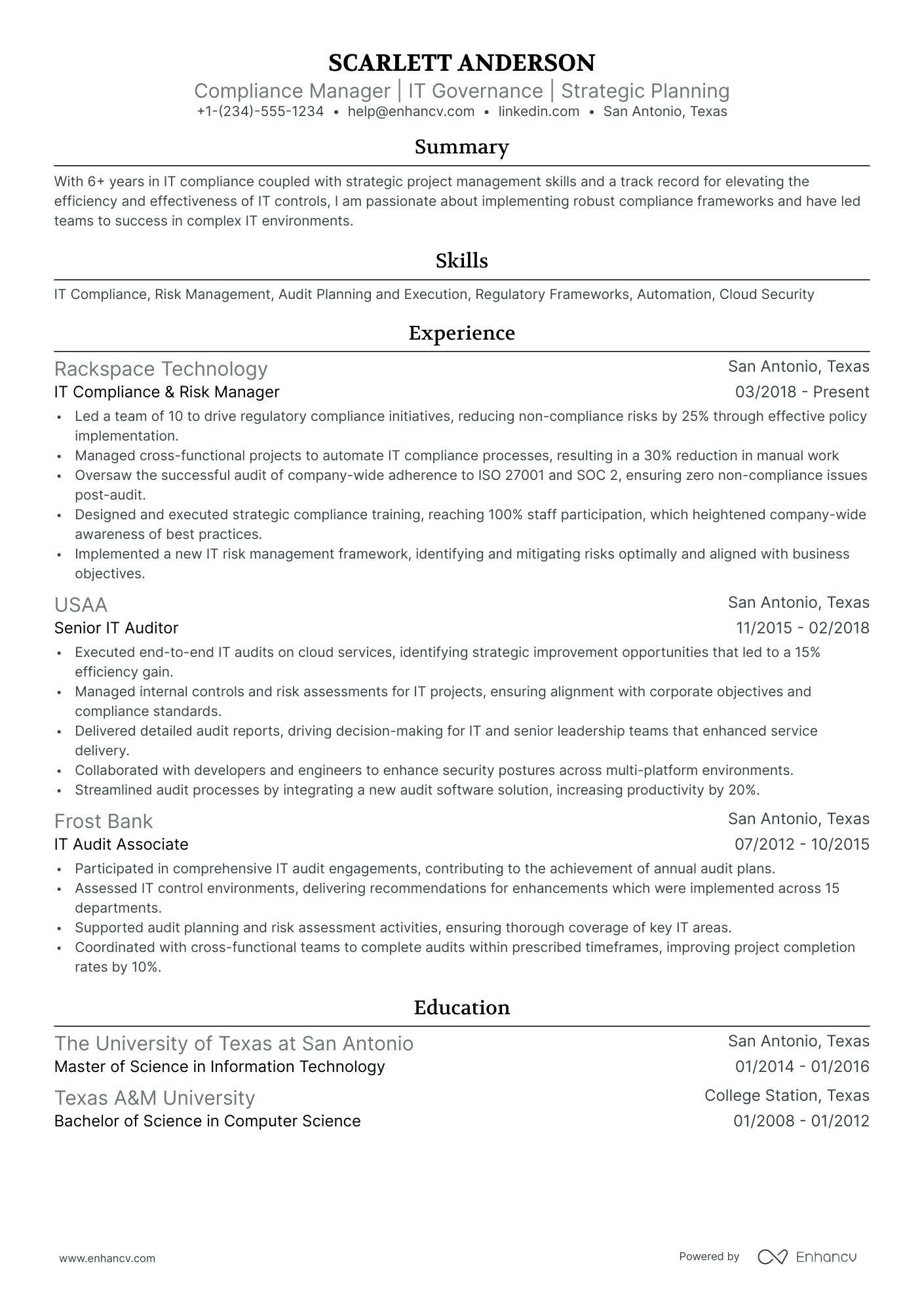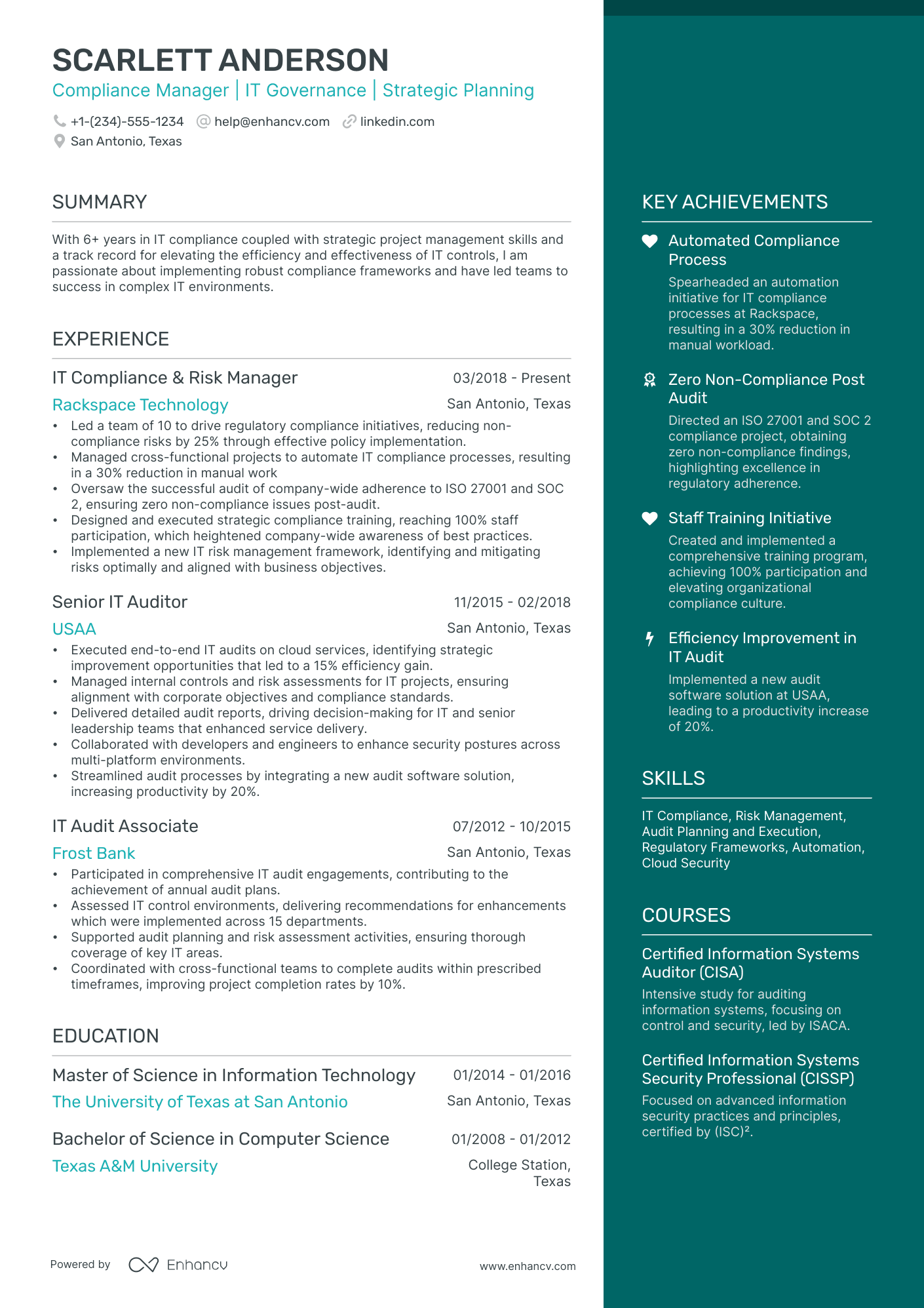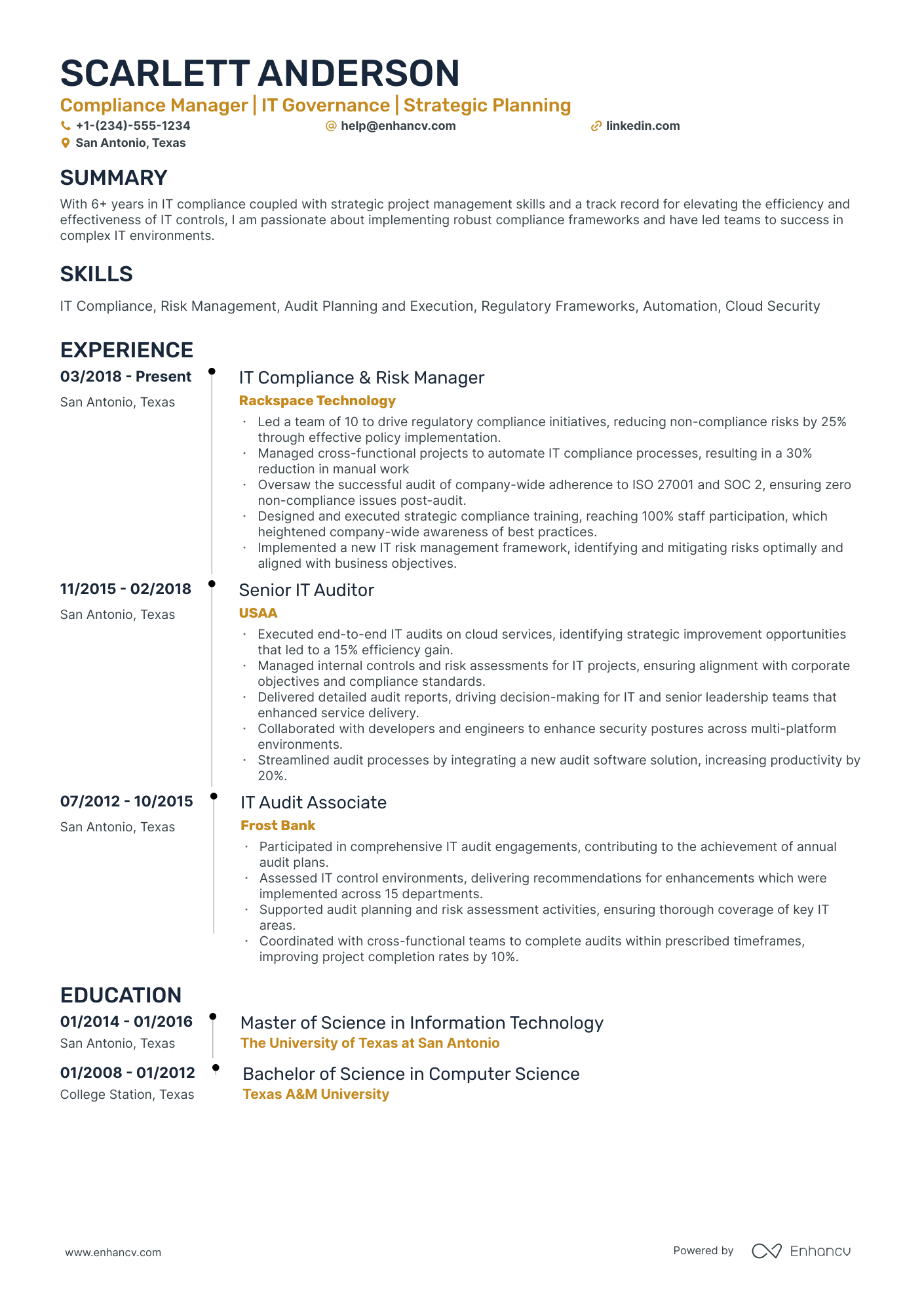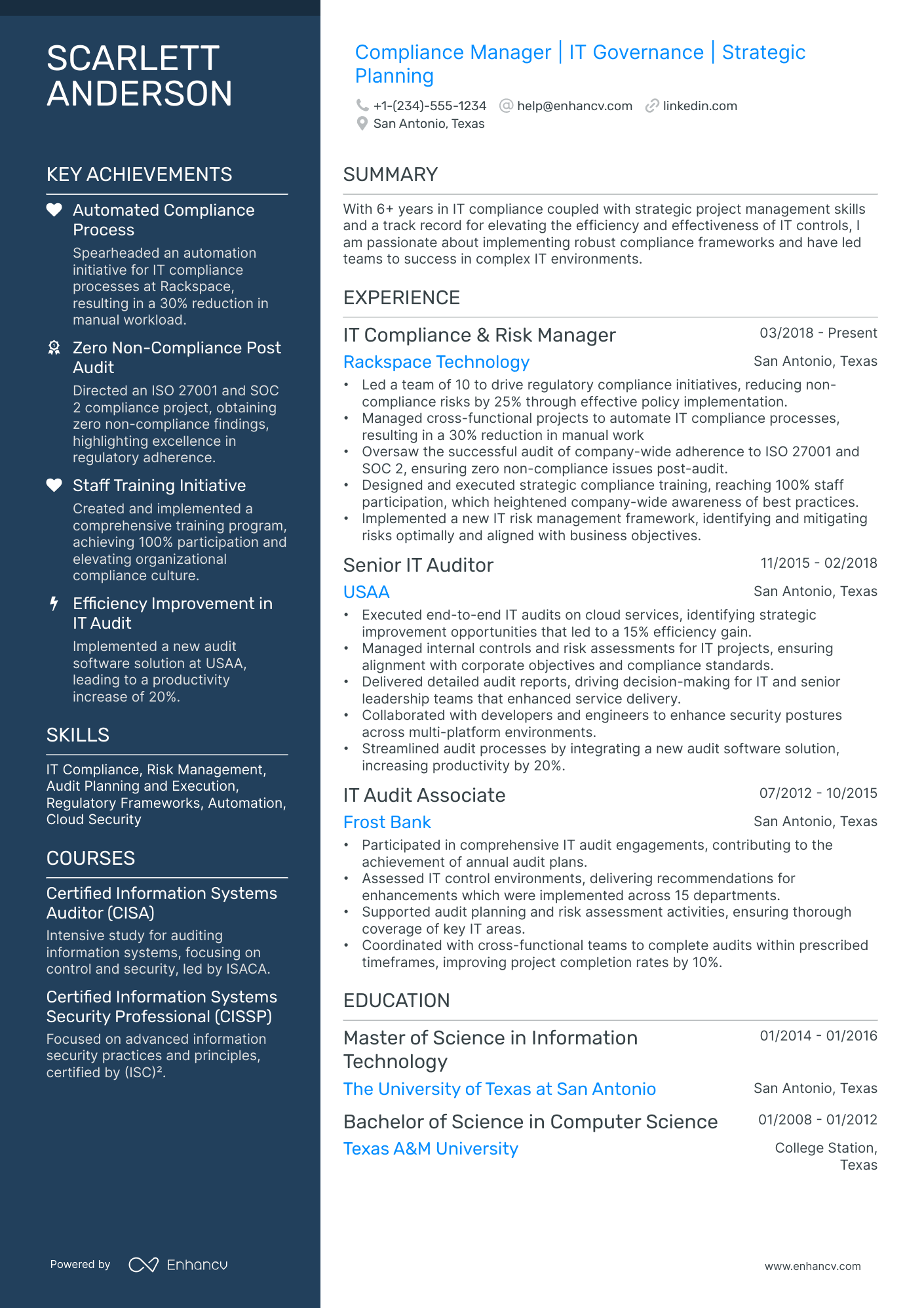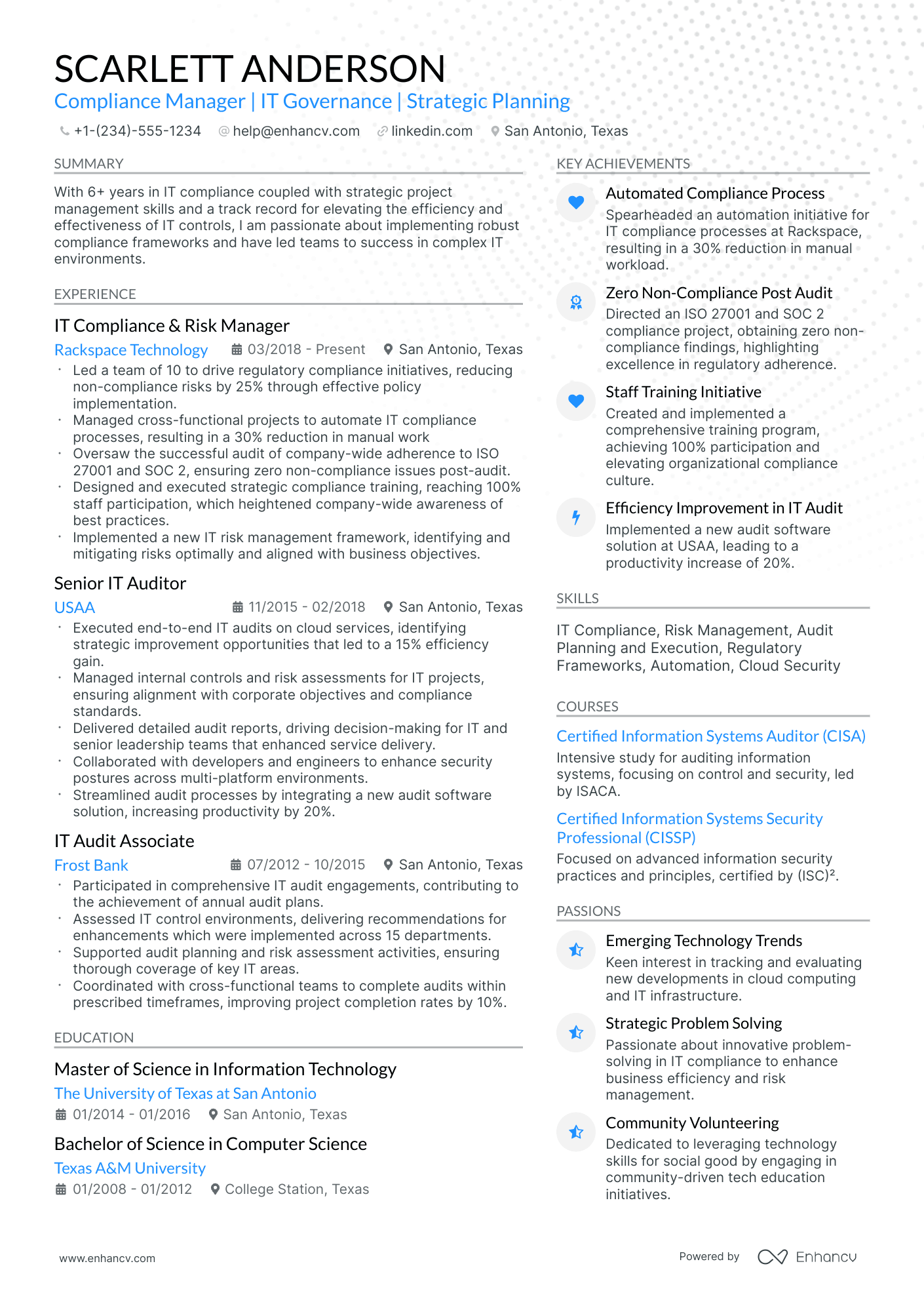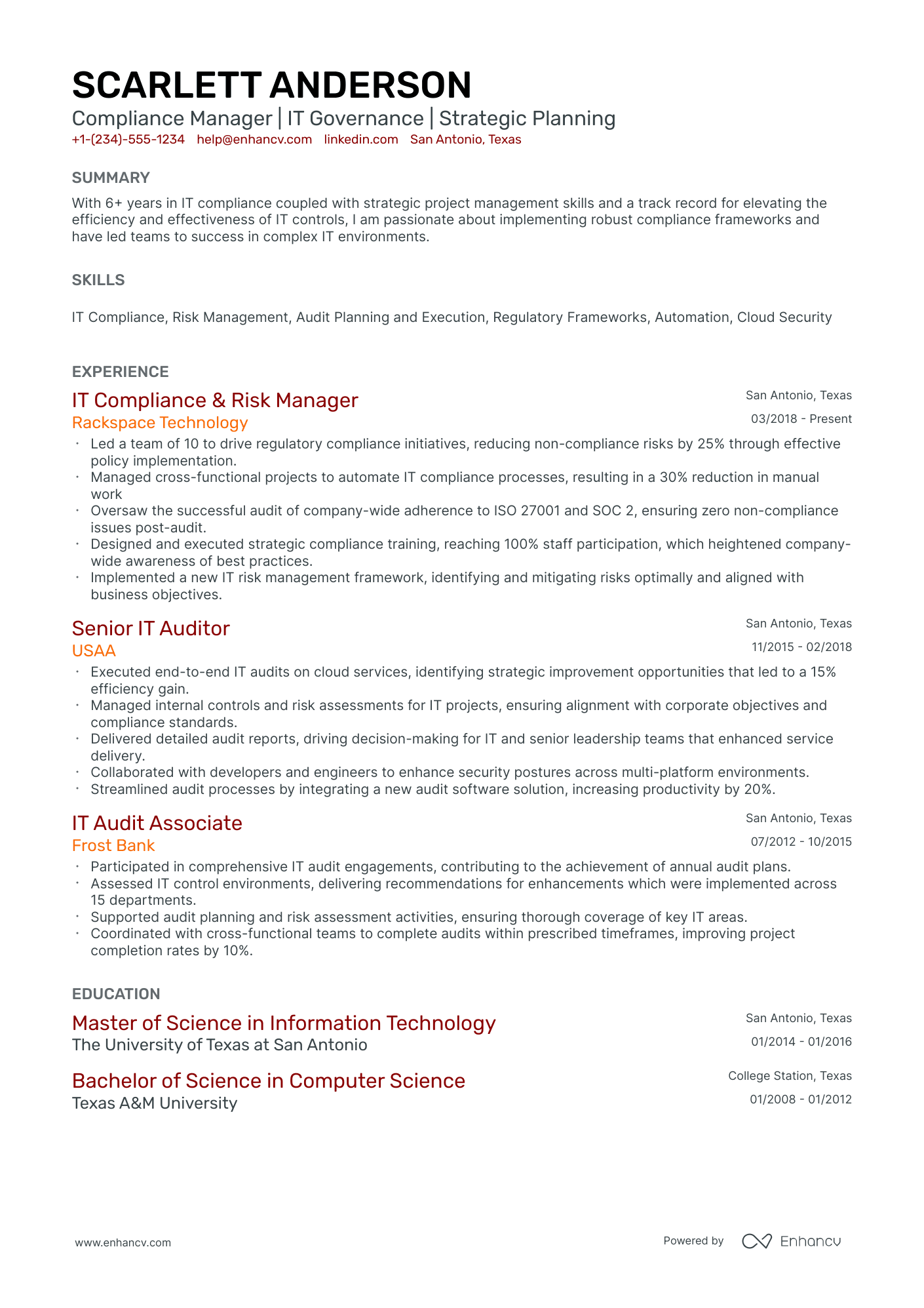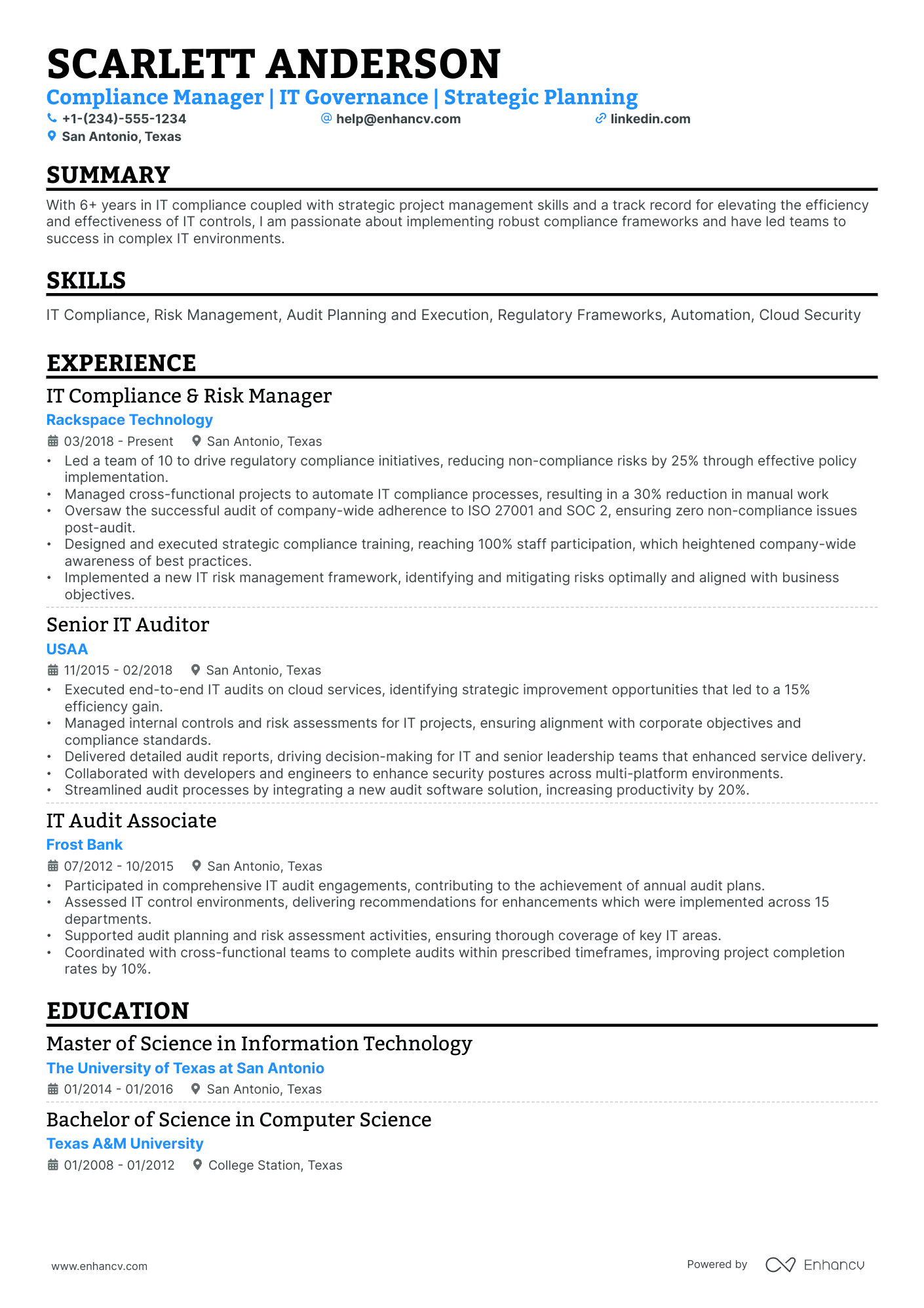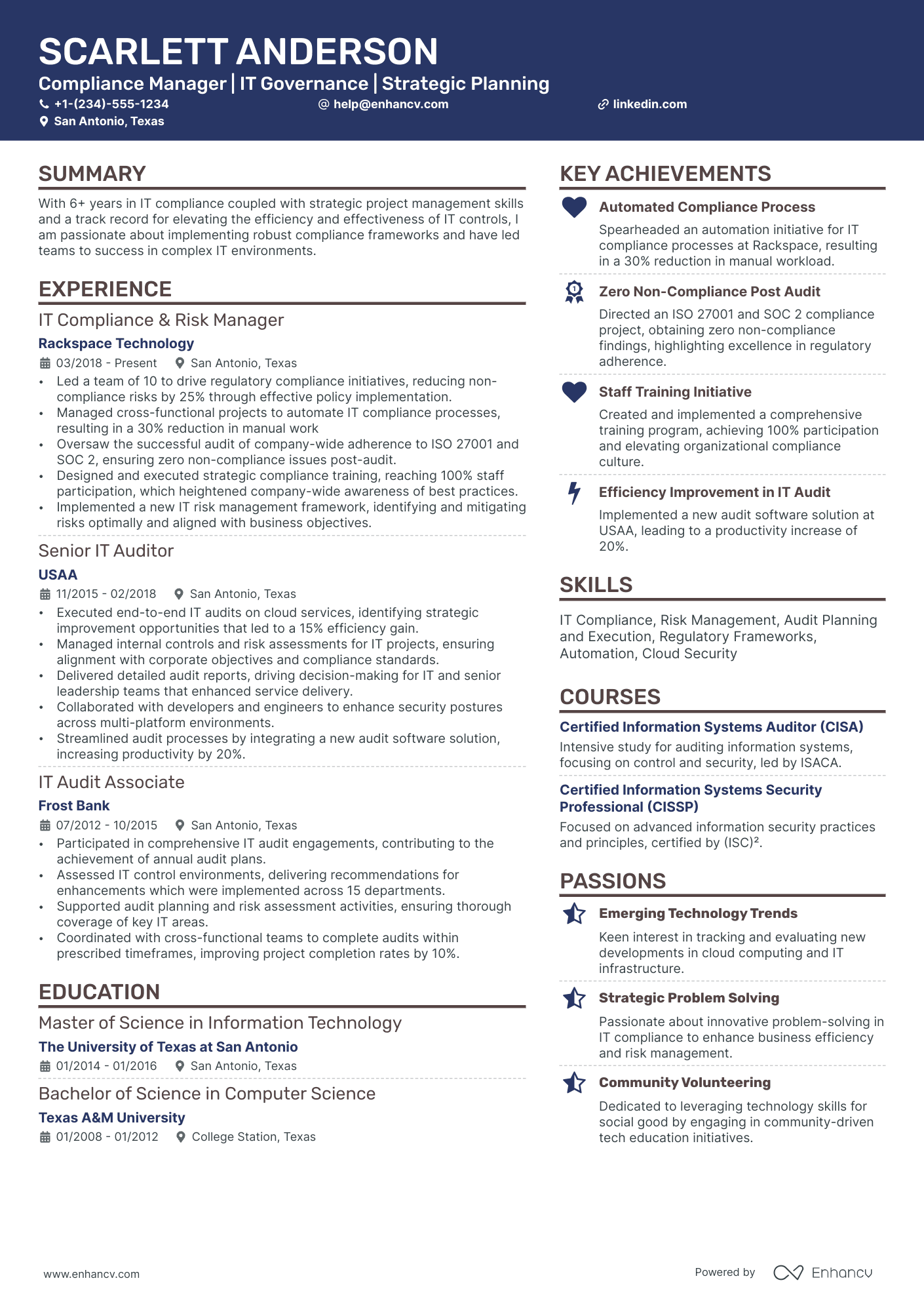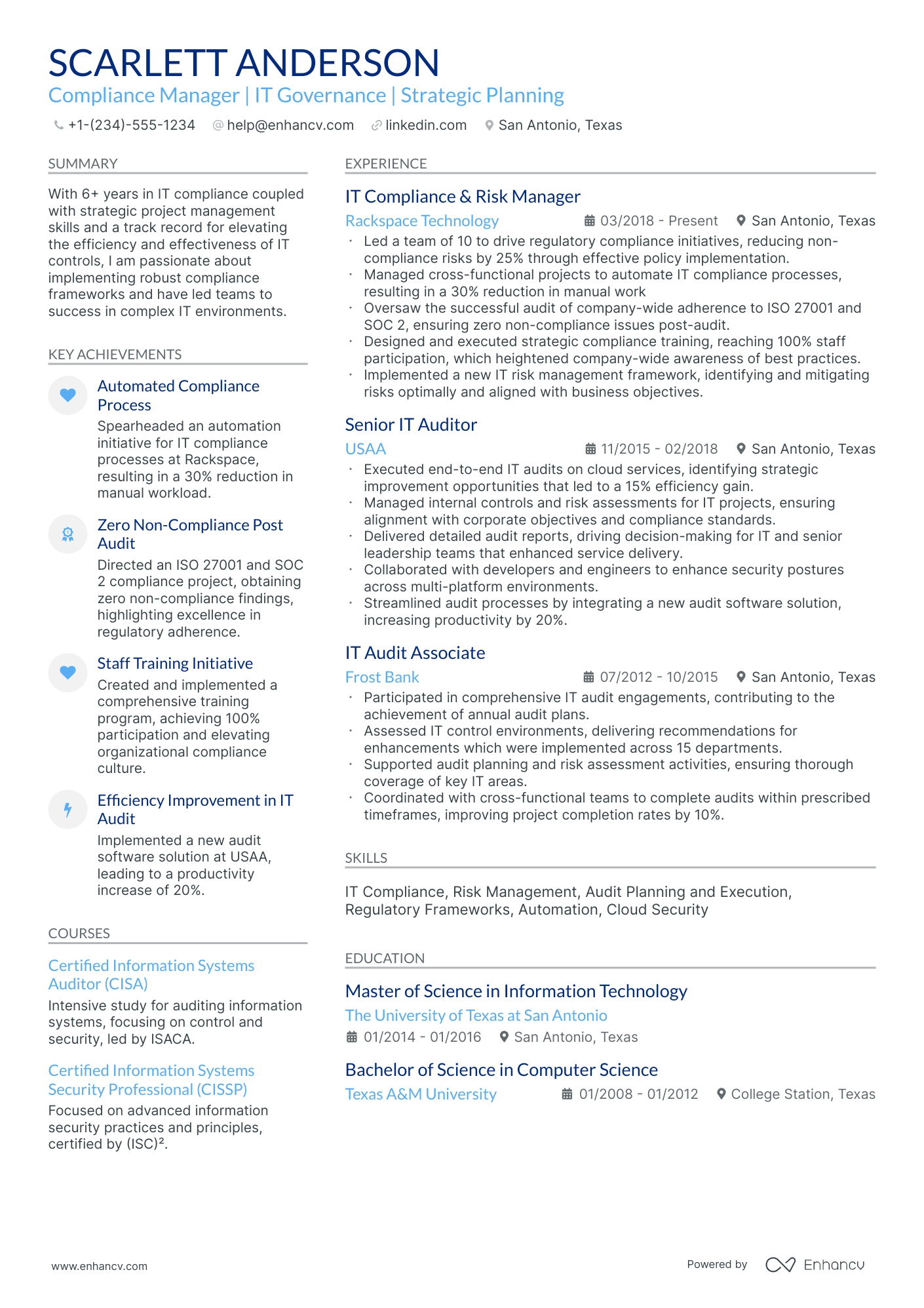As a big 4 auditor, articulating your complex auditing experiences into a concise resume that stands out can be a significant challenge. Our guide provides you with targeted strategies and language tips that will help you distill your achievements into a compelling narrative that resonates with hiring managers.
- Format your big 4 auditor resume to ensure that it balances professionalism with creativity, and follows the best practices.
- Match the big 4 auditor job requirements by including industry keywords on your resume.
- Use various resume sections to showcase your skills and achievements to answer why you're the best candidate for the big 4 auditor role.
Take inspiration from leading big 4 auditor resume examples to learn how to tailor your experience.
The importance of format and layout in your big 4 auditor resume
Consider you're an HR professional at company X, evaluating two big 4 auditor candidate resumes. John Smith presents a simple, traditional, and easy-to-read resume. Edward Price, however, uses a non-conventional, often illegible format. Whose resume would you spend more time on to understand their experience? This scenario underscores the importance of your big 4 auditor resume’s design. It should be simply formatted and clearly communicate why you are the ideal candidate for the role.
Achieve this balance by:
- Listing your experience, beginning with the most recent and relevant, in reverse chronological order;
- Ensuring your header contains essential information, such as contact details, a headline, and a portfolio link. Include a professional photo in the big 4 auditor resume header if you have one;
- Including only the most important and relevant resume sections to showcase your expertise and stand out from other candidates;
- Editing your big 4 auditor resume to be no longer than two pages if you have extensive relevant experience. Use your limited resume space judiciously.
Also, remember that your big 4 auditor resume might initially be scanned by an Applicant Tracker System (ATS).
When it comes to ATS:
- Opt for simple and legible fonts like Raleway, Rubik, Lato, etc., making your experience easy for the ATS to scan;
- Use serif and sans-serif fonts, both of which are ATS-friendly;
- Avoid overused options like Arial and Times New Roman, which, while suitable, may lack personality.
Contrary to a common myth, our recent study shows that the ATS can effectively process both one-column and two-column resumes. Learn more about this in the ATS myths guide.
Finally, when submitting your big 4 auditor resume, always export it as a PDF to ensure all information remains intact, making the document easier to print, read, and scan.
Adjust your resume layout based on the market – Canadian resumes, for example, may follow a unique format.
Upload & Check Your Resume
Drop your resume here or choose a file. PDF & DOCX only. Max 2MB file size.
PRO TIP
If you failed to obtain one of the certificates, as listed in the requirements, but decide to include it on your resume, make sure to include a note somewhere that you have the "relevant training, but are planning to re-take the exams". Support this statement with the actual date you're planning to be re-examined. Always be honest on your resume.
Fundamental sections for your big 4 auditor resume:
- The header with your name (if your degree or certification is impressive, you can add the title as a follow up to your name), contact details, portfolio link, and headline
- The summary or objective aligning your career and resume achievements with the role
- The experience section to curate neatly organized bullets with your tangible at-work-success
- Skills listed through various sections of your resume and within an exclusive sidebar
- The education and certifications for more credibility and industry-wide expertise
What recruiters want to see on your resume:
- Relevant Audit Experience (e.g., experience in financial statement audits, internal controls audit, or specific industry exposure like financial services, technology, etc.)
- Professional Certifications (e.g., CPA, ACA, ACCA, CA, CISA for IT audits)
- Technical Proficiency (e.g., knowledge of GAAP, IFRS, auditing standards, data analytics tools like ACL, Tableau, or advanced Excel skills)
- Client Engagement Skills (e.g., experience in managing client relationships, understanding client business processes, and communication skills)
- Leadership and Teamwork (e.g., experience leading audit engagements, working with cross-functional teams, or evidence of mentorship and staff development)
What to include in the experience section of your big 4 auditor resume
The resume experience section is perhaps the most important element in your application as it needs to showcase how your current profile matches the job.
While it may take some time to perfect your big 4 auditor experience section, here are five tips to keep in mind when writing yours:
- Assess the advert to make a list of key requirements and look back on how each of your past jobs answers those;
- Don't just showcase you know a particular skill, instead, you need proof in the form of tangible results (e.g. numbers, percent, etc.);
- It's perfectly fine to leave off experience items that don't bring anything extra to your skill set or application;
- Recruiters want to understand what the particular value is of working with you, so instead of solely featuring technologies, think about including at least one bullet that's focused on your soft skills;
- Take care with wording each bullet to demonstrate what you've achieved, using a particular skill, and an action verb.
The below big 4 auditor resume examples can help guide you to curate your professional experience, following industry-leading tips and advice.
- Led a team of 5 to conduct comprehensive financial audits for mid-size tech firms, identifying key areas of financial risk and proposing actionable recommendations.
- Managed the end-to-end audit process for a portfolio of clients, resulting in the error-free submission of compliance reports and a 10% increase in client retention year-over-year.
- Streamlined the audit workflow using data analytics tools, reducing the average audit cycle by 15% and enhancing the accuracy of financial reporting.
- Oversaw financial statement audits for large multinational corporations, focusing on compliance with GAAP and identifying any discrepancies.
- Implemented new audit methodologies across team operations that increased the efficiency of document reviews and internal control evaluations by 20%.
- Trained and mentored junior auditors, enhancing the overall skill set of the department and contributing to a 25% reduction in turnover.
- Developed and executed risk-based audit plans for healthcare clients, ensuring rigorous compliance with industry regulations.
- Analyzed and interpreted complex transactions and events, and provided financial insights that contributed to a 5% improvement in clients' operational efficiencies.
- Facilitated communications between audit teams and C-level executives, ensuring that all parties were informed and engaged throughout the audit processes.
- Serve as the lead auditor on software and technology sector engagements, enhancing reporting systems which led to a 10% gain in audit process effectiveness.
- Initiate and cultivate relationship management with new and existing clients, driving a 15% uptick in business development for the division.
- Spearhead regulatory compliance initiatives within the audit team, strengthening client trust and ensuring adherence to the latest financial legislation.
- Specialized in performing operational and financial audits for clients in the retail sector, identifying opportunities for cost reduction and revenue enhancement.
- Directed a cross-functional team through complex consolidated audit engagements, driving the timely delivery of audit findings and management reports.
- Utilized advanced auditing software to scrutinize financial documents, uncovering fraudulent activities that saved clients over $1 million in potential losses.
- Entrusted with leading high-profile audit engagements for Fortune 500 clients, ensuring transparency and compliance with federal regulations.
- Introduced innovative data visualization techniques that enabled stakeholders to understand complex financial data easily, enhancing decision-making processes.
- Collaborated with international audit teams to maintain consistency in auditing standards and practices, resulting in a uniform quality of service to global clients.
- Conducted detailed tax audits for large nonprofit organizations, ensuring accurate representation of financial statements and tax compliance.
- Developed a comprehensive training program for new auditors that increased team productivity by 30% within the first year.
- Optimized audit procedures through the integration of leading ERP software, significantly boosting data accuracy and stakeholder confidence.
- Played a pivotal role in forensic audits for financial services clients, identifying irregularities and recommending enhanced controls to mitigate future risks.
- Crafted detailed audit reporting for the SEC and other regulatory bodies, upholding the highest standards of reporting precision and timeliness.
- Engaged in continuous professional development, staying abreast of changing regulations, which significantly improved the depth of audit findings.
Quantifying impact on your resume
- Highlight the total assets or revenue of clients you have audited, which demonstrates your ability to manage and assess large-scale financial operations.
- Include the number of audit engagements you've participated in, showing your extensive experience in the field.
- Mention any reductions in audit time or increases in efficiency you contributed to, quantifying your ability to streamline processes.
- Specify the number of team members you've supervised or collaborated with, indicating your leadership and teamwork skills.
- Detail the amount or percentage of cost savings identified through your audit recommendations to showcase your contribution to financial improvement.
- List any awards or recognitions received, especially those based on performance metrics, to display your competence and excellence.
- Quantify any improvements in risk management or compliance rates as a result of your audits, highlighting your attention to detail and impact on operational integrity.
- Include the number of regulatory changes you've adapted to, providing evidence of your ability to stay informed and responsive to the dynamic financial landscape.
Action verbs for your big 4 auditor resume
Remember these four tips when writing your big 4 auditor resume with no experience
You've done the work - auditing the job requirements for keywords and have a pretty good idea of the skill set the ideal candidate must possess.
Yet, your professional experience amounts to a summer internship .
Even if you have limited or no professional expertise that matches the role you're applying for, you can use the resume experience section to:
- List extracurricular activities that are relevant to the job requirements. Let's say you were editor-in-chief of your college newspaper or part of the engineering society. Both activities have taught you invaluable, transferrable skills (e.g. communication or leadership) that can be crucial for the job;
- Substitute jobs with volunteer experience. Participating in charity projects has probably helped you develop an array of soft skills (e.g. meeting deadlines and interpersonal communications). On the other hand, volunteering shows potential employers more about you: who you are and what are the causes you care about;
- Align job applications with your projects. Even your final-year thesis work could be seen as relevant experience, if it's in the same industry as the job you're applying for. Ensure you've listed the key skills your project has taught you, alongside tangible outcomes or your project success;
- Shift the focus to your transferrable skills. We've said it before, but recruiters will assess your profile upon both job requirements and the skills you possess. Consider what your current experience - both academic and life - has taught you and how you've been able to develop your talents.
Recommended reads:
PRO TIP
List all your relevant higher education degrees within your resume in reverse chronological order (starting with the latest). There are cases when your PhD in a particular field could help you stand apart from other candidates.
Big 4 auditor resume skills section: writing about your hard skills and soft skills
Recruiters always care about the skill set you'd bring about to the big 4 auditor role. That's why it's a good idea to curate yours wisely, integrating both hard (or technical) and soft skills. Hard skills are the technology and software you're apt at using - these show your suitability for the technical aspect of the role. They are easy to track via your experience, certifications, and various resume sections. Your soft skills are those personality traits you've gained over time that show how you'd perform in the specific team, etc. Soft skills are more difficult to qualify but are definitely worth it - as they make you stand out and show your adaptability to new environments. How do you build the skills section of your resume? Best practices point that you could:
- Include up to five or six skills in the section as keywords to align with the advert.
- Create a specific technical skills section to highlight your hard skills aptitude.
- Align the culture of the company you're applying to with your soft skills to determine which ones should be more prominent in your skills section.
- Make sure you answer majority of the job requirements that are in the advert within your skills section.
A big 4 auditor's resume requires a specific skill set that balances both industry-specific hard skills with personal, soft skills. Discover the perfect mix for the big 4 auditor role from our list:
Top skills for your big 4 auditor resume:
GAAP
IFRS
Excel
SAP
SQL
Audit Management Software
Data Analytics Tools
Tax Software
Financial Statement Analysis
Risk Assessment Tools
Analytical Thinking
Attention to Detail
Communication
Problem Solving
Time Management
Teamwork
Adaptability
Critical Thinking
Client Relationship Management
Ethical Judgment
PRO TIP
The more time and effort you've put into obtaining the relevant certificate, the closer to the top it should be listed. This is especially important for more senior roles and if the company you're applying for is more forward-facing.
Showcase academic background with education and certifications' sections
Listing your education and certifications should be a rudimentary part of your resume writing.
Including your relevant academic background - in the form of your higher education degree and niche-specific certificates - will prove knowledge of the industry.
For your education section:
- Start by including your degree, followed by start and graduation dates, as well as the institution;
- You could include relevant coursework, major/minor , or GPA, only if your've just graduated from college or if this information would further support your application;
- If you have an "ongoing" degree, you can still list it in case you think your diploma can impress recruiters or it's required;
Follow a similar logic for your certifications section by listing the institution, alongside dates you've obtained the certificate. For some of the most recent and relevant industry certificates , check out the next part of our guide:
The top 5 certifications for your big 4 auditor resume:
- Certified Public Accountant (CPA) - American Institute of CPAs
- Chartered Accountant (CA) - Various global chartered accountancy bodies
- Certified Internal Auditor (CIA) - Institute of Internal Auditors
- Chartered Financial Analyst (CFA) - CFA Institute
- Certified Information Systems Auditor (CISA) - Information Systems Audit and Control Association
PRO TIP
Bold the names of educational institutions and certifying bodies for emphasis.
Recommended reads:
Should you write a resume summary or an objective?
No need to research social media or ask ChatGPT to find out if the summary or objective is right for your big 4 auditor resume.
- Experienced candidates always tend to go for resume summaries. The summary is a three to five sentence long paragraph that narrates your career highlights and aligns your experience to the role. In it you can add your top skills and career achievements that are most impressive.
- Junior professionals or those making a career change, should write a resume objective. These shouldn't be longer than five sentences and should detail your career goals . Basically, how you see yourself growing in the current position and how would your experience or skill set could help out your potential employers.
Think of both the resume summary and objective as your opportunity to put your best foot forward - from the get go - answering job requirements with skills.
Use the below real-world big 4 auditor professional statements as inspiration for writing your resume summary or objective.
Resume summaries for a big 4 auditor job
- With over 8 years of intensive experience in auditing at a renowned financial firm in London, I have developed a robust expertise in GAAP, risk management, and financial reporting. Recognized for leading a team that successfully uncovered a significant accounting discrepancy, which prevented a potential financial crisis for a major client.
- Dynamic CPA with a decade’s experience in auditing for multinational corporations, adept in the complexities of tax legislation and financial compliance across several industries. Instrumental in executing cross-border audits that enhanced process efficiencies, and achieved accolades for outstanding accuracy in financial forecasting.
- Accomplished financial analyst seeking to leverage 7 years of experience in constructing intricate models and comprehensive market research into the sphere of auditing. Expert in quantitative analysis, with a proven track record of driving business decisions for top-tier investment firms in New York City.
- Seasoned IT professional with a passion for detail and 10 years’ hands-on experience in system administration, eager to transfer technical skills to the auditing field. Acknowledged for implementing robust cybersecurity measures that fortified data integrity for a Silicon Valley tech giant's internal networks.
- Eager to apply a strong foundation in business administration, honed through hands-on leadership of startup initiatives, to the realm of auditing. Aspires to employ analytical prowess and a meticulous approach to elevate financial practices and contribute to maintaining the fiscal health of esteemed global entities.
- A fresh graduate with a Bachelor's in Accountancy, intent on initiating a career in auditing through harnessing academic knowledge of financial principles and accounting software. Commended for academic research that offered novel insights into streamlining budget allocation processes for non-profit organizations.
Optimize your resume summary and objective for ATS
Drop your resume here or choose a file.
PDF & DOCX only. Max 2MB file size.
More sections to ensure your big 4 auditor resume stands out
If you're looking for additional ways to ensure your big 4 auditor application gets noticed, then invest in supplementing your resume with extra sections, like:
These supplementary resume sections show your technical aptitude (with particular technologies and software) and your people skills (gained even outside of work).
Key takeaways
- Invest in a concise big 4 auditor professional presentation with key resume sections (e.g. header, experience, summary) and a simple layout;
- Ensure that the details you decide to include in your resume are always relevant to the job, as you have limited space;
- Back up your achievements with the hard and soft skills they've helped you build;
- Your experience could help you either pinpoint your professional growth or focus on your niche expertise in the industry;
- Curate the most sought-after certifications across the industry for credibility and to prove your involvement in the field.
